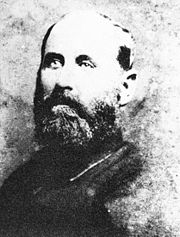
John Dunn (1834-1895)
Encyclopedia

South Africa
The Republic of South Africa is a country in southern Africa. Located at the southern tip of Africa, it is divided into nine provinces, with of coastline on the Atlantic and Indian oceans...
n settler, hunter, and diplomat of Scottish descent. Born in either Port Elizabeth or Port Natal in 1834, he spent his childhood in Port Natal/Durban.
When Dunn was still young, his father was trampled to death by an elephant. His mother died a few years later. He started to earn a living by working for transport riders and hunters. His love of hunting and his skill with a rifle took him across the Tugela River
Tugela River
The Tugela River is the largest river in KwaZulu-Natal Province, South Africa. The river originates in the Drakensberg Mountains, Mont-aux-Sources, and plunges 947 metres down the Tugela Falls...
into Zululand
Zulu Kingdom
The Zulu Kingdom, sometimes referred to as the Zulu Empire or, rather imprecisely, Zululand, was a monarchy in Southern Africa that extended along the coast of the Indian Ocean from the Tugela River in the south to Pongola River in the north....
on a regular basis, where he became fluent in the language and was befriended by local chiefs. Their hospitality often included offering him a wife, and though he was previously married to Catherine Pierce - daughter of a white settler father and mother of Cape Malay ancestry - he accepted a total of 48 Zulu wives during his lifetime, much to Catherine's disapproval. Dunn built his home at Mangete, near the Ngoye Forest in Zululand.
Career
The bloody battle of succession fought between king MpandeMpande
Mpande , uMsimude owavela ngesiluba phakathi kwamaNgisi namaQadasi, as he was praised, was king of the Zulu nation from 1840 to 1872, making him the longest reigning Zulu king. He was a half-brother of Shaka and Dingane, who both preceded him as kings of the Zulu...
's sons Mbuyasi and Cetshwayo
Cetshwayo
Cetshwayo kaMpande was the King of the Zulu Kingdom from 1872 to 1879 and their leader during the Anglo-Zulu War . His name has been transliterated as Cetawayo, Cetewayo, Cetywajo and Ketchwayo.- Early life :...
forced Dunn and other white settlers to flee back to Natal. After the battle, he re-crossed the Tugela to ask that the winner, Cetshwayo, return the cattle that had belonged to the settlers. Cetshwayo agreed, and also requested that Dunn become his advisor in matters related to the British
United Kingdom
The United Kingdom of Great Britain and Northern IrelandIn the United Kingdom and Dependencies, other languages have been officially recognised as legitimate autochthonous languages under the European Charter for Regional or Minority Languages...
. Again, Dunn's skill in arms no doubt stood him in good stead. His cattle were returned and he was allocated land near present-day Mtunzini.
On 18 October 1872, King Mpande died at the age of 74 and Cetshwayo became king, and Dunn's power and influence rose; he handled nearly all of Cetshwayo's foreign correspondence. He was the main conduit for the import of thousands of firearms into Zululand, mostly antiquated muskets. Though Mpande
Mpande
Mpande , uMsimude owavela ngesiluba phakathi kwamaNgisi namaQadasi, as he was praised, was king of the Zulu nation from 1840 to 1872, making him the longest reigning Zulu king. He was a half-brother of Shaka and Dingane, who both preceded him as kings of the Zulu...
and Cetshwayo had successfully resisted attempts by the Boers and the British to encroach on their territory, the Anglo-Zulu War
Anglo-Zulu War
The Anglo-Zulu War was fought in 1879 between the British Empire and the Zulu Kingdom.Following the imperialist scheme by which Lord Carnarvon had successfully brought about federation in Canada, it was thought that a similar plan might succeed with the various African kingdoms, tribal areas and...
of 1879 forced John Dunn to pick sides, and he sided with the British.
On 11 January 1879, British troops crossed the Tugela, near Fort Pearson, after the British had presented Cetshwayo with an ultimatum he could not accept. It is said that Dunn's skill at arms contributed greatly to British successes in the south. In the north the British, anticipating Cetshwayo's refusal of the ultimatum, had already crossed the river, only to be soundly defeated at the Battle of Isandlwana
Battle of Isandlwana
The Battle of Isandlwana on 22 January 1879 was the first major encounter in the Anglo-Zulu War between the British Empire and the Zulu Kingdom...
.
On 1 September 1879, Zululand
Zulu Kingdom
The Zulu Kingdom, sometimes referred to as the Zulu Empire or, rather imprecisely, Zululand, was a monarchy in Southern Africa that extended along the coast of the Indian Ocean from the Tugela River in the south to Pongola River in the north....
was annexed and incorporated in Natal. In the Ulundi Settlement of 1879, Dunn was given the largest piece of land of all thirteen rulers in the subdivision of Zululand, and closest to Durban, where he served as a buffer zone between the British and the less-trusted rulers.

